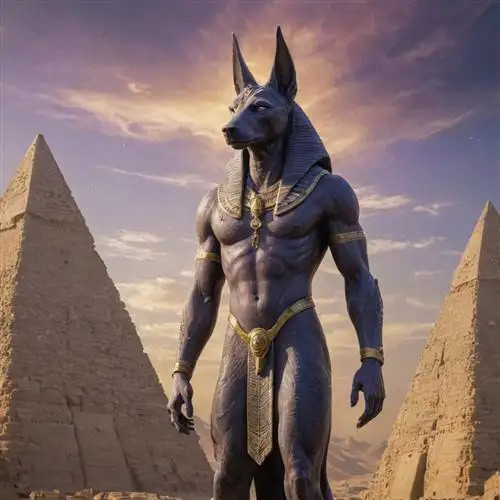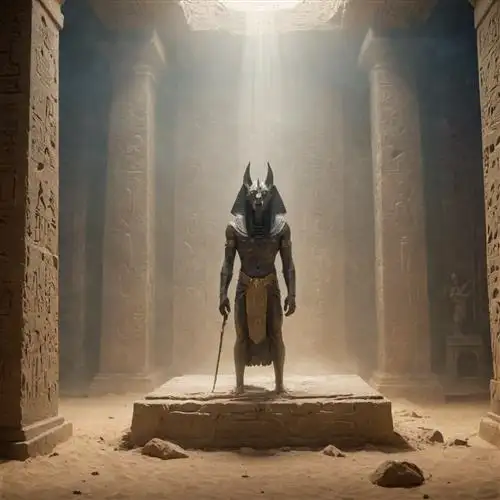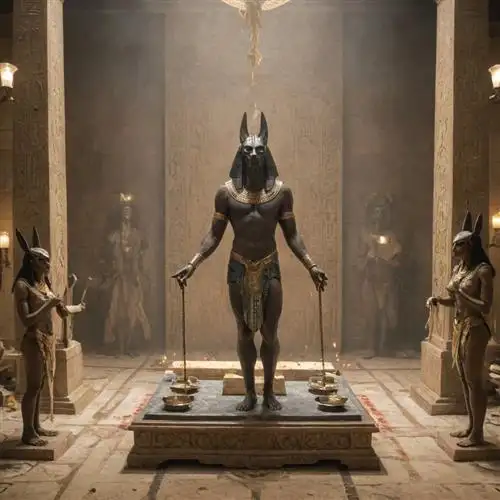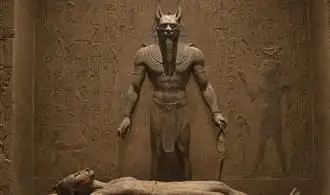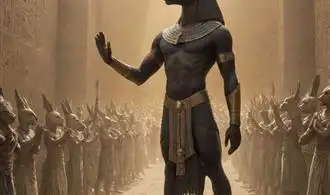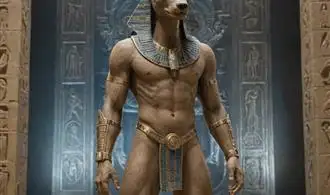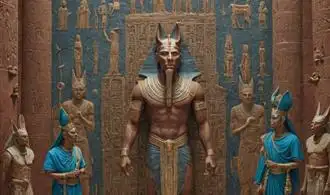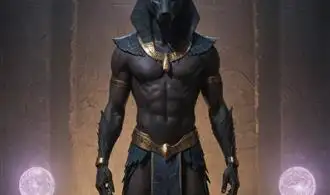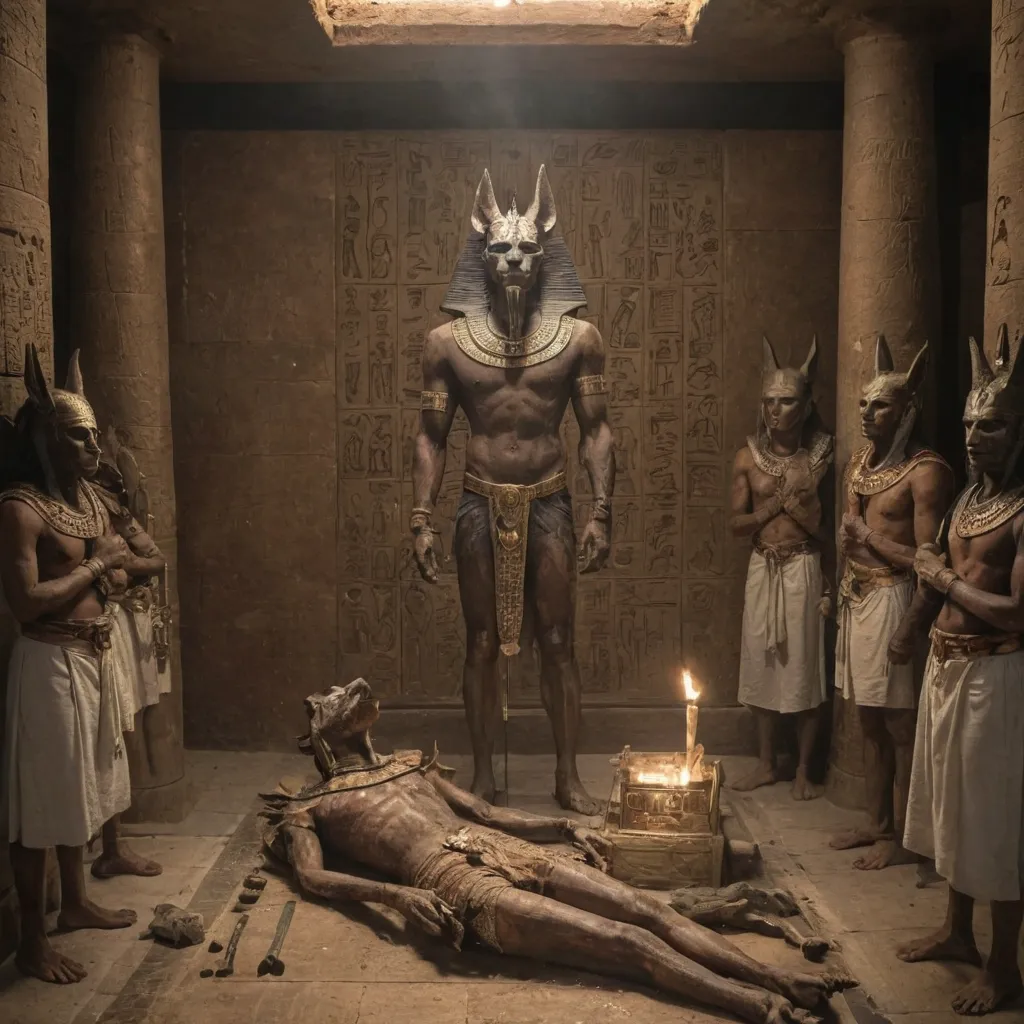
Unveiling the Mysteries of Anubis
As we delve into the mysteries of Anubis, the Egyptian god of the afterlife, we uncover a captivating realm that holds profound insights into the human experience. Anubis, the jackal-headed deity, stands as a gatekeeper between the realms of the living and the dead, guiding the souls of the departed on their eternal journey.
At the heart of Anubis's role lies the process of mummification, a sacred ritual that was believed to preserve the physical form and ensure a smooth transition to the afterlife. This intricate procedure, which was overseen by Anubis himself, involved the removal of the internal organs, the drying of the body, and the wrapping of the remains in linen. These meticulous steps were not merely practical but also carried deep symbolic meaning, reflecting the Egyptian belief in the continuity of life beyond the physical form.
Anubis's responsibilities extended far beyond the act of mummification. As the conductor of the weighing of the heart ceremony, Anubis played a crucial role in the judgment of the deceased. This ritual, known as the "Weighing of the Heart," involved the placement of the deceased's heart on a scale, where it was measured against the feather of truth. If the heart was found to be pure and free from sin, the individual was granted passage to the afterlife. However, if the heart was deemed heavy with misdeeds, the soul would face eternal damnation. This profound concept of moral accountability and the consequences of one's actions resonates deeply with the human experience, offering a powerful framework for understanding the complexities of the afterlife.
Anubis's dominion over the afterlife also extended to the protection and guidance of the deceased. As they navigated the treacherous journey through the underworld, the dead were believed to be under the watchful eye of Anubis. This concept is beautifully captured in the article "Let Anubis Guide You Through the Underworld", which delves into the significance of Anubis as a guardian and companion to the departed.
Unlocking the Secrets of the Afterlife
Anubis, the ancient Egyptian god of the dead, has long been a source of fascination for those seeking to unravel the mysteries of the afterlife. As the guardian of the underworld and the embalmer of the deceased, Anubis holds the key to understanding the complex rituals and beliefs surrounding death and the transition to the next life. By delving into the intricate symbolism and mythology surrounding Anubis, we can gain valuable insights into the ancient Egyptian perspective on the afterlife and the crucial role this enigmatic deity played in guiding the souls of the departed.
At the heart of Anubis' significance lies the belief that he was responsible for weighing the hearts of the deceased against the feather of Ma'at, the goddess of truth and justice. This pivotal moment, known as the "Weighing of the Heart," determined whether the soul would be granted passage to the afterlife or condemned to eternal damnation. The outcome of this sacred ceremony not only determined the fate of the individual but also reflected the extent to which they had lived a righteous and virtuous life. By understanding the intricacies of this ritual, we can gain a deeper appreciation for the ancient Egyptians' reverence for truth, justice, and the importance of living a life of balance and harmony.
Furthermore, Anubis' role as the embalmer of the deceased sheds light on the ancient Egyptians' meticulous approach to the preservation of the physical body. The mummification process, overseen by Anubis, was believed to be crucial in ensuring the soul's successful transition to the afterlife. The intricate procedures involved in this process, from the removal of the internal organs to the wrapping of the body in linen, were imbued with symbolic meaning and were seen as essential in preparing the deceased for their journey to the afterlife.
By Experts Spill the Secrets of Anubis, we can gain a deeper understanding of Anubis' multifaceted role in the ancient Egyptian conception of the afterlife. From his function as the guardian of the underworld to his role as the embalmer of the deceased, Anubis' presence was integral to the belief system of the ancient Egyptians, who saw him as a crucial figure in the cycle of life, death, and rebirth.
The Role of Anubis in the Afterlife Journey
Anubis, the jackal-headed Egyptian god, played a pivotal role in the ancient Egyptian conception of the afterlife. As the patron deity of embalming and the guide of the dead, Anubis was responsible for ensuring the smooth transition of the deceased from this world to the next. His presence was a crucial element in the complex and intricate rituals that were performed to ensure the safe passage of the soul.
Central to Anubis's role was the mummification process. He was believed to oversee the embalming of the body, a meticulous procedure that involved the removal of the internal organs, the preservation of the body, and the wrapping of the remains in linen. This process was essential in preserving the physical form of the deceased, which was believed to be necessary for the soul to return to the body during the afterlife.
But Anubis's involvement in the afterlife journey did not end with the mummification process. He was also responsible for guiding the deceased through the treacherous underworld, known as the Duat, and ensuring their safe arrival in the realm of the dead. In this role, Anubis was often depicted as accompanying the deceased on their journey, protecting them from the dangers that lurked in the Duat.
One of the most important rituals in which Anubis played a central role was the Weighing of the Heart ceremony. This ceremony, which took place in the Hall of Judgement, involved the weighing of the deceased's heart against the feather of Ma'at, the goddess of truth and justice. If the heart was found to be pure and free of sin, the deceased was granted passage to the afterlife. Anubis was responsible for overseeing this ceremony, ensuring the fairness and accuracy of the proceedings.
The Weighing of the Heart Ceremony and Anubis
In ancient Egyptian mythology, the Weighing of the Heart ceremony was a crucial ritual that determined the fate of the deceased in the afterlife. At the center of this ritual stood Anubis, the jackal-headed god who played a vital role in guiding the dead through the complexities of the underworld.
Anubis was responsible for the embalming of the deceased and the preparation of the body for the afterlife. He was also the god who presided over the Weighing of the Heart ceremony, where the deceased's heart was weighed against the feather of truth, representing the concept of justice and moral righteousness.
The ceremony began with the dead individual's heart being placed on one side of a scale, while the feather of truth was placed on the other. Anubis, the master of this ritual, would carefully observe the proceedings, ensuring the balance was maintained. If the heart was found to be pure and free from sin, it would be lighter than the feather, and the deceased would be granted passage to the afterlife.
However, if the heart was deemed heavier than the feather, it was considered impure and unworthy of entering the afterlife. In such cases, the heart would be devoured by the devouring monster Ammit, a composite creature with the head of a crocodile, the torso of a lion, and the hindquarters of a hippopotamus. This fate was seen as the ultimate punishment, as it meant the individual's soul would cease to exist, unable to move on to the next stage of their journey.
The Weighing of the Heart ceremony held immense significance in ancient Egyptian culture, as it was believed to be a decisive moment that determined the deceased's eternal fate. Anubis, as the overseer of this ritual, played a crucial role in guiding the dead and ensuring justice was served in the afterlife.
Anubis and the Mummification Process
Anubis, the ancient Egyptian jackal-headed god, played a pivotal role in the intricate rituals of mummification, a practice that was central to the belief system and culture of ancient Egypt. As the god responsible for the embalming process, Anubis ensured the deceased's successful transition to the afterlife, guiding them through the complex journey of death and rebirth.
The mummification process, overseen by Anubis, was a meticulously choreographed ritual that transformed the mortal body into a vessel for the immortal soul. The process involved the following key steps:
- Removal of the internal organs, which were then placed in canopic jars, symbolizing the protection and preservation of the deceased's soul.
- Desiccation of the body using natron, a naturally occurring salt, which removed all moisture and prevented decomposition.
- Wrapping the body in linen bandages, a process that required great skill and attention to detail to ensure the preservation of the form.
- Placement of amulets and talismans within the wrappings, each with their own symbolic meaning and purpose, to protect and guide the deceased in the afterlife.
- Recitation of sacred spells and incantations, invoking the power of Anubis and other deities to ensure the successful transition of the soul to the afterlife.
Anubis was not only responsible for the physical process of mummification but also for the spiritual and metaphysical aspects of the journey. As the god of the dead, Anubis was believed to weigh the heart of the deceased against the feather of Ma'at, the goddess of truth and justice, to determine the worthiness of the individual's soul. This ritual, known as the "Weighing of the Heart," was a crucial step in the afterlife journey, as it determined whether the deceased would be granted eternal life or condemned to eternal oblivion.

